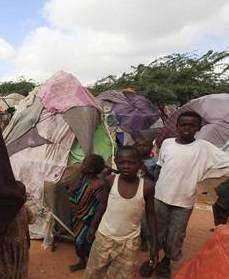Hassan Ali Khaire: Hunger, disease kill 110 in two days
05/03/2017| IslamWeb
Somalia's prime minister has announced the deaths of at least 110 people due to hunger and diarrhea in the country over the past 48 hours amid a drought in the Bay region.
The announcement by Hassan Ali Khaire on Saturday followed the Somali government's warning last week that the drought amounts to a national disaster.
"It is a difficult situation for the pastoralists and their livestock. Some people have been hit by [hunger] and diarrhea at the same time. In the last 48 hours 110 people died due to [hunger] and diarrhea in Bay region," Khaire's office said in a statement.
The Bay region is in the southwest part of the country.
"The Somali government will do its best, and we urge all Somalis wherever they are to help and save the dying Somalis," said the statement, released after a meeting of a famine response committee.
Mostly children and elderly people died in villages surrounding the town of Baido, Abdullahi Omar Roble, the government's regional humanitarian chief, told the DPA news agency.
There was not enough medication to treat all of the patients, Roble said.
The drought has led to a spread of acute watery diarrhea, cholera and measles and nearly 5.5 million people are at risk of contracting waterborne diseases.
The cholera outbreak has killed at least 69 since Friday, a local government official said.
More than 70 others have been hospitalized.
UN experts have sounded a warning on deaths related to cholera and other diseases that arise from a lack of clean water.
The UN estimates that five million people nationwide need aid, amid warnings of a full-blown famine.
Thousands have streamed into the capital, Mogadishu, in search of food aid, overwhelming local and international aid agencies.
More than 7,000 internally displaced people checked into one feeding center recently.
About 363,000 acutely malnourished children in Somalia "need urgent treatment and nutrition support, including 71,000 who are severely malnourished", the US Agency for International
Development's Famine Early Warning Systems Network has said.
The Somali government has said the widespread hunger "makes people vulnerable to exploitation, human rights abuses and to criminal and terrorist networks".
Somalia was one of four regions singled out by the UN secretary-general last month in a $4.4bn aid appeal to avert catastrophic hunger and famine, along with northeast Nigeria, South Sudan and Yemen.
In 2011, an estimated 260,000 people starved to death in Somalia.
The UN humanitarian appeal for 2017 for Somalia is $864m, to provide assistance to 3.9 million people.
But the UN World Food Program recently requested an additional $26m plan to respond to the drought.
The drought is the first crisis for Somalia's newly elected Somali-American leader, President Mohamed Abdullahi Mohamed, who is also known as Farmajo.
Mohamed has appealed to the international community and Somalia's diaspora of two million people for help.
Previous droughts and a quarter-century of conflict, including ongoing attacks by al-Shabab, have left the country fragile.
PHOTO CAPTION
Displaced people in Dinsoor, January 5, 2012. REUTERS
Al-Jazeera

